Accelerating digital development through multistakeholder partnerships
ITU Regional Office (Europe), UNECE
Session 229
High-level peer-learning roundtable of the UNECE Regional Forum on Sustainable Development
The peer-learning session on ‘Accelerating digital development through multistakeholder partnerships’ is organized by the UN Digital Transformation Group for Europe and Central Asia, and coordinated by ITU and UNECE, with the facilitation of EDF, UNDP, UNIDO, and WMO.
Information and communication technologies (ICTs), meaningful and universal internet connectivity, capacity building, financing mechanism, and financial inclusion are intrinsic to SDG17 “Partnerships for the Goals”, and all are crucial for an inclusive, sustainable, and resilient digital transformation. In addition, and as highlighted by SDG 17, digital development can only be made through a multistakeholder and partnership-based approach, and with the direct leadership of governments, policymakers, and the regulator community. The UN Secretary-General’s Roadmap for Digital Cooperation has called for concrete actions by diverse stakeholders and a more effective architecture to enhance the global digital cooperation in order to: (i) connect all communities and overcome the digital divide; (ii) take a human-centered digital transformation which respects rights and (iii) protect everyone from online risk and harms. Since then a series of concrete actions have been supported by the UN Secretary-General’s Envoy on Technology.
In light of the above, and with the aim to review the achievement of the SDG17, in particular targets related to internet connectivity (17.6) and technology, including ICTs (17.7 and 17.8), this session will seek to strengthen and promote the development of digital society and economy through multistakeholder partnerships.
It will provide an opportunity for UN Agencies, Member States, the private sectors, the academia sector, NGOs, and additional stakeholders to discuss collaborative actions, initiatives, and partnerships that advance digitalization and digitization processes alongside encouraging global partnerships for SDG focused digital development.
In particular, the session will address four pillars: connecting people everywhere, empowering communities, building digital ecosystems, and incentivizing investments. It will provide an opportunity for highlighting a series of strategic multistakeholder partnerships aiming at providing concrete support to the countries in their endeavours of accelerating digital transformation, ensuring that no one is left behind.
It will include and is not limited to the following:
- Partner2connect Digital Coalition, an alliance gathering actors from the private sectors, UN sister agencies, Governments, and Youth organizations, aiming to foster digital transformation and meaningful connectivity;
- Giga initiative, which aims to grasp the power of meaningful connectivity to fast track young people’s access to educational resources and opportunities, and works with partner countries to systematically help governments connect every school to the internet through a four pillars approach: mapping, connecting, financing and empowering;
- GovStack Initiative: The GovStack initiative aims to build a common understanding and technical practice on fundamental reusable and interoperable digital components, which we collectively refer to as Building Blocks. It aims to enable countries to kickstart their digital transformation journey by adopting, deploying, and scaling digital government services.
Partnerships among member states and regional actors of development are also prominent. The session will be the occasion to update and exchange on the European Commission’s recently launched ‘Global Gateway’, a ‘Team Europe’ (EU-Members States- Financial institutions) commitment unveiled by Commission President Von der Leyen; or to explore different investment models with the EBRD’s “Approach to accelerating the digital transition, 2021-25”.

Ms. Natalia Mochu holds bachelor’s degree in mathematics and informatics and master’s degree in information technology from the State University of Moldova. Before joining the ITU in February 2020, Natalia occupied the post of Senior Manager for Global Stakeholder Engagement for Eastern Europe and Central Asia at the Internet Corporation for Assigned Names and Numbers (ICANN). In 2012-2018 she worked as Deputy Head of Laboratory at the Radio Research and Development Institute (NIIR) in Moscow. From 2006 to 2012 Natalia worked for the Executive Committee of the Regional Commonwealth in the field of Communications (RCC), in particular she was the RCC Executive Committee Deputy Director General in 2008-2012. Natalia started her professional career as Specialist of the Ministry of Information Development of the Republic of Moldova in 2002. Natalia participated in ITU high-level conferences and meetings, including ITU Plenipotentiary Conferences, Councils and Sectoral Conferences; contributed to the activities of RCC working bodies, European Conference of Postal and Telecommunications Administrations, as well as ICANN, RIPE NCC and other relevant organizations.

Elisabeth Tuerk, Director, Economic Cooperation and Trade, UNECE. Ms. Tuerk is Director of the Economic Cooperation and Trade Division (ECTD) at UNECE and leads the Division’s work across its four Sections: Cooperation and Partnerships, Innovative Policies Development, Market Access and Trade Facilitation. Prior to that, Ms. Tuerk acted as Chief of the Section on International Investment Agreements (IIAs) in UNCTAD’s Division on Investment and Enterprise (DIAE), where she led the Section's work across the three pillars of UNCTAD activities: research and analysis, capacity-building and consensus-building. Ms. Tuerk also coordinated the Section's contribution to other UNCTAD products, such as the joint UNCTAD/OECD monitoring of G20 countries' investment policy changes, the annual World Investment Report (WIR), and the biennial World Investment Forum (WIF), including key events such as Ministerial Roundtables. Ms. Tuerk’s earlier professional activities included functions in UNCTAD’s Division on International Trade and Commodities (DITC), covering e.g. WTO accessions and GATS negotiations, in the Geneva office of the Center for International Environmental Law (CIEL) and in the World Trade Organization (WTO). Ms. Tuerk holds a master’s degree from the World Trade Institute (WTI) in Bern, Switzerland, and both a degree in international management and a degree in law from the KarlFranzens Universität in Graz, Austria
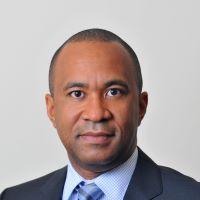
Stephen Bereaux is the Deputy to the Director of the ITU Telecommunication Development Bureau since 7 March 2020. Mr. Bereaux is an experienced regulator, with more than 20 years of executive and senior management experience in regulatory bodies in the Caribbean region. Prior to joining ITU, Mr Bereaux was Chief Executive Officer of the Utilities Regulation and Competition Authority (URCA), Bahamas which regulates the ICT and Electricity sectors, advises the Government on policies relating to those sectors, and represents The Bahamas at international sector related organisations such as the ITU. Prior to joining URCA in 2010, Mr. Bereaux served in senior management roles at the Telecommunications Authority of Trinidad and Tobago (TATT) from 2004. Before becoming a Regulator, Mr. Bereaux, an Attorney by profession since 1996, practiced law at multinational firms based in London and Hong Kong, specialising in Information Technology and Telecommunications Law

Olga Algayerova, Executive Secretary of the United Nations Economic Commission for Europe, United Nations Economic Commission for Europe( ECE). On 13 April 2017, United Nations Secretary-General António Guterres appointed Olga Algayerova of Slovakia as the next Executive Secretary of the United Nations Economic Commission for Europe (ECE). Her term of office starts on 1 June 2017. Ms. Algayerova brings to the position a combination of leadership and diplomatic skills, as well as deep knowledge of the region’s challenges and opportunities and a strong focus on building and nurturing partnerships among key stakeholders with the United Nations. Currently Permanent Representative of Slovakia to the International Organizations in Vienna, Austria, since 2012, she was previously President of the Slovak Millennium Development Goals (2010-2012); State Secretary in the Ministry of Foreign Affairs (2006-2010); and Corporate Export Manager at Zentiva International, a.s. (2004-2006). Born in 1959, she holds a master’s degree in contemporary diplomacy from Malta University, a Master of Business Administration degree from the Open University Business School in the United Kingdom, and an Engineer of Economy diploma from the Bratislava Business School at Slovakia’s University of Economics.

Askhat Orazbek. Vice-Minister of Digital Development, Innovations and Aerospace Industry of the Republic of Kazakhstan. Orazbek started his career in 1995 as Engineer in Computer Mathematical Physics Laboratory under the Ministry of Education and Science of the Republic of Kazakhstan. In the period1999 to 2003, he occupied the following positions: Chief Specialist in Analysis and Information Unit under the Agency for Reorganization and Liquidation of Companies; Software Engineer, Head of Unit in “Kushpen-Telecom” LLP. Later he was appointed as Supervisor in Informatization and Data Protection Division underState Secrets Protection and Informatization Unit, Executive Office of the President of the Republic of Kazakhstan. In 2006, A. Orazbek occupied the position of Chairman of the Board in National Information Technologies JSC. In the period 2008 to 2012, he occupied the following positions: Director in “Center for Technical Maintenance and Analysis in the field of Telecommunication”; Chairman of the Board in National Information Technologies JSC; Deputy Chairman of the Board in “Zerde” National ICT Holding JSC. Since 2012, he had occupied the positions of Advisor in “Al.As.Ay ” LLP; Director of IT Department in “KazTransOil” JSC; Executive Director for IT in “TransTelecom” JSC. Since 2017, he worked as Advisor for Business Development in “PiNetworks” LLP and Vice-President in Association for Blockchain and Cryptotechnologies Development in the Republic of Kazakhstan. In April 2019, A. Orazbek was appointed Vice-Minister of Digital Development, Innovations and Aerospace Industry of the Republic of Kazakhstan.
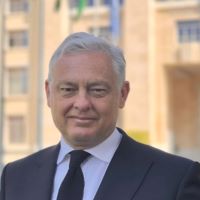
Simon Manley CMG, Ambassador and Permanent Representative, UK Mission to the WTO, UN and Other International Organisations (Geneva) Simon Manley, CMG took up his post as the United Kingdom’s Permanent Representative to the World Trade Organization, United Nations and other International Organisations based in Geneva in April 2021.Simon oversees the work of the UK Mission in Geneva and represents the United Kingdom in its engagement with over 35 international organisations, agencies and offices based in the city. These include the UN Human Rights Council, the World Trade Organization, the World Health Organization, the UN High Commissioner for Refugees, the International Telecommunications Union, the International Red Cross and Red Crescent Movement, CERN, and the World Economic Forum.Simon has been a member of Her Majesty’s Diplomatic Service since 1990. He was British Ambassador to Spain and non-resident Ambassador to Andorra from October 2013 until August 2019. Simon has held a number of senior roles in the FCO (now FCDO) in London, including: Director-General, Covid-19 (2020), Director, Europe (2011 to 2013), Director, Defence and Strategic Threats (2008 to 2011) and Head of Counter-Terrorism (2006 to 2008). Earlier in his career, he worked at the UK’s Mission to the United Nations in New York, and was twice seconded to the European Union: the first time to the European Commission and the second to the Council of the European Union. Simon was made a Companion of the Order of St Michael and St George (CMG) in HM The Queen’s Birthday Honours in 2009. Simon studied Modern History at Magdalen College, Oxford and International Relations at Yale University Graduate School. He is married to Maria Isabel Fernandez Utges Manley. They have three daughters.

Draško Milinović was born on October 9th, 1974 in Prijedor. He acquired the title of graduate journalist at the Faculty of Philosophy in Banja Luka. In the period from 1997 to 2006, he worked as an editor and host on several local radio stations in Prijedor, and in several editorial offices of the Radio -Television of Republika Srpska (RTRS). Following that, until 2014, he performed the duty of Public Relations Advisor to the President of Republika Srpska, the Head of the Cabinet of the President of Republika Srpska and the Head of the Cabinet of the Prime Minister of Republika Srpska, when he took over the position of Director General of Radio-Television of Republika Srpska (RTRS), one of the Public Services in Bosnia and Herzegovina.
Since 2020 Mr. Milinović serves as the Director General of Communications Regulatory Agency, Bosnia and Herzegovina.

Kristine Gyonjyan is the Director of the NGO “Union of Operators of Armenia”. Recently she was elected Chairman of the Board of Trustees of the “Community Networks” Development Foundation. She is a member of the Internet Governance Council of the Republic of Armenia (IGC) and a board member of “Internet Society” NGO.
Under Kristine’s leadership the Union of Operators had significant contribution in the development of telecommunications sector in Armenia, working on policy improvement, digital skills development, child online safety issues, rural areas broadband internet development programs as well as working close with Government and International organizations.Her involvement in telecommunications sector started in 2016 when she accepted the job offer from Arpinet LLC, as the Head of Business Development and Marketing Department. Before that she was working for Microsoft, managing educational programs in Armenia and acting as an Edu Business development manager. She created first ever Innovative Teachers Network and helped many schools to use innovative technologies in their learning and teaching process. She also has great experience in working in the UN projects as a national and international expert. Apart from this, she had big investment in establishment and management of the "Innovation Ethnic Regional Center" of the "Cross of Armenian Unity". She also teaches at different Universities more than 20 years.

Yannis Vardakastanis was born on the Greek island of Zakynthos in 1957. Throughout his life he has been an active disability rights campaigner. Since 2007 he has been the European Disability Forum (EDF) representative on IDA’s board. After the IDA elections of 2021, he holds the office of IDA President, while from 2010 to 2012 he held the position of Vice Chair, from 2012 to 2014 the position Chair and from 2014 to 2021 the position of Treasurer. Since 1999 he has been the President of EDF. He has also been the President of the National Confederation of Disabled People of Greece (N.C.D.P.) since 1993. From 2010 until the present day, he is a member of the European Economic and Social Committee (EESC) representing the N.C.D.P. in Group III. More particularly, he holds the office of one of the Vice Presidents of Group III.

Oleg Pekos is the first Deputy Minister for the development of information technologies and communications of the Republic of Uzbekistan. He was born in 1988 in the Tashkent region. H.E Pekos studied at the St. Petersburg State University of Telecommunications. From 2011 to 2017, he held various positions in the communication sector. After which, he became the Deputy Head of Telecommunication Networks Development Department of "Uzbektelecom" JSC from 2017 to 2018, and then held the position of Deputy Director, Director of the Information Systems Center of "Uzbektelecom" JSC from 2018 to 2019, and after Director of Telecommunication Transport Network branch of "Uzbektelecom" JSC from 2019 to 2020, before starting his current position as First Deputy Minister for Development of Information Technologies and Communications of the Republic of Uzbekistan since June 2020. H.E Pekos is married and has three children.
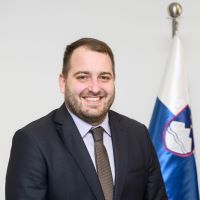
Andrej Čuš did his undergraduate and graduate studies at the Faculty of Applied Business and Social Studies and gained the title of Master of Intercultural Management. He is currently completing doctoral studies. Andrej Čuš has been State Secretary at the Ministry of Economic Development and Technology since 22 March 2021.He has been an active member of society since high school, when he assumed the leadership of the local secondary school student club and then became a president of the Secondary School Student Organisation of Slovenia. In 2009, he was also a member of the Council of the Government of Slovenia for Youth. As a university student, he assumed the leadership of the local student club and was active in several organisations. He was also a member of the supervisory board of the Youth Council of Slovenia. He ran for the first time in the 2011 parliamentary elections and in 2013 became an alternate deputy in the National Assembly of Slovenia. He was re-elected a deputy of the National Assembly in the 2014 parliamentary elections and focused primarily on sustainable development, green technologies, youth initiatives and harmonious regional development At the end of his term of office as a deputy in the period 2014-2018, he found employment in the commercial sector.
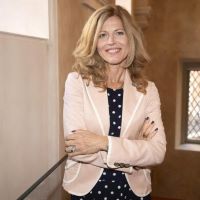
After obtaining a degree in Business Economics at the University la Sapienza in Rome, she earned an M.A. in Organization and Management of Insurance Undertakings at the LUISS Business School of Rome. She is the Managing Director of CBI S.c.p.a, a company that develops cross-border digital payment services focusing cash management, for banks, financial intermediaries and the Public Administration. In her professional path, she also has been an expert at the European Commission for E-invoicing and chaired the Financial Services Working Group of the National Committee on Trade Facilitation at the Italian Ministry for Economic Development. She performs a variety of roles, including those of:
- Independent board member of listed companies
- UN/CEFACT (United Nations Centre for Trade Facilitation and Electronic Business) Vice-Chair of the Pay Section of the International Supply Chain Programme Development Area and liaison Rapporteur of the UNECE to the ISO Technical Committee on Financial Services (ISO TC68)
- Italian Delegate for UNINFO of the ISO 20022 Registration Management Group (RMG)
- Member of the Board of Directors of UNINFO (Italian standardization body for the Information and Communication Technology)
Over the years she is the author of articles and papers that have been published at the domestic and international level. She is also a keynote speaker and an opinion leader for digitalization, e-payments, open finance and gender diversity.

Davit Nadirashvili is the head of the Digital Governance Agency of Georgia (a legal entity of public law under the Ministry of Justice of Georgia) and has over 22 years of experience in both public and commercial companies. Mr. Nadirashvili graduated from Tbilisi State University in 2003, and his first education qualifies him as a lawyer but he is also an expert in the field of information and communication technologies. His professional career began when he was still a student, and he worked in several government organizations as an official, until 2019, including the Special State Protection Service, the General Prosecutor's Office, the Ministry of Defense, and others. After moving to the private sector in 2019 and serving for two years, he returned to the state service and since September 2021 has been in charge of heading the agency, which is Georgia's premier digital transformation and cyber security organization with a workforce of more than 100 employees.
Davit speaks two foreign languages, Russian and English, in addition to his own tongue, Georgian and it's worth mentioning that he is a tremendous force in the office, inspiring others to work hard and succeed with his optimistic attitude and never-ending enthusiasm.

Ivonne Higuero, Secretary-General of the Convention on International Trade in Endangered Species of Wild Fauna and Flora (CITES). Ms. Ivonne Higuero is an environmental economist with a career spanning 26 years in international organizations in the area of sustainable development. She has experience working at the global, regional and national levels, and engaging with stakeholders across the public and private sectors. During her 24 years with the UN, she has held varied roles managing financial and human resources, overseeing the implementation of programmes of work and the provision of secretariat services to intergovernmental bodies. Ms. Higuero served at the UN Environment headquarters in Nairobi and the Regional Office for Europe, as the Coordinator of the Pan-European Biological and Landscape Diversity Strategy and as the focal point for biodiversity related and regional sea conventions, amongst other natural resource management roles between 1994 and 2014. Between 2014 and 2018, she served in the United Nations Economic Commission for Europe, most recently as the Director of the Economic Cooperation and Trade Division where she led and supervised programmes on trade facilitation, access to markets, innovation and competitiveness policies and public-private partnerships. Prior to this, she was Director of the Commission’s Forests, Land and Housing Division and Chief of the Operational Activities and Review Section of the Environment Division. She is a national of Panama and holds a Bachelor of Science degree in Biology from the University of Missouri (United States of America) and a Masters’ of Environmental Management Degree in Natural Resource Economics and Policy from Duke University (United States of America).

Umberto Modigliani is the Deputy Director of Forecasts, collaborating closely with the Department Director, contributing to the management of the Forecast Department (~100 staff). The department is responsible for the 24/7 timely production of ECMWF's computer-based forecasts, forecast quality, software development, liaison with forecast users, user support, data sales and software licensing. The department also manages the acquisition, processing and quality control of observations, globally, of the atmosphere and oceans. The job includes many international engagements. His work also includes comprehensive reporting on plans and progress to the formal committees and Council which constitute the ECMWF governance.

Dirk Werner is a Director in the Banking Department of the EBRD (European Bank for Reconstruction and Development), based in London and Head of the Telecommunications, Media and Technology (TMT) sector. In this role, Dirk oversees the Bank’s lending and equity investment business to companies in this sector and in the Bank’s countries of operation. His remit includes policy dialogue with the public sector as well. Digitalization strategies for companies in the Bank’s countries of operation are a significant focus of Dirk’s work. Supporting digitalization is furthermore an overall strategic objective for the EBRD. Prior to joining the EBRD at the beginning of 2015, Dirk held Managing Director roles in investment banking, including at Sberbank Corporate and Investment Banking in Moscow from 2012 to 2014 and at Bank of America Merrill Lynch based in London from 2007 to 2011. Earlier positions included senior investment banking roles at Lehman Brothers in New York and London and at Morgan Stanley in London. Dirk graduated as Diplom-Volkswirt (M.A. Economics) from the Georg-August University of Göttingen and studied at Amherst College, Massachusetts, U.S.A
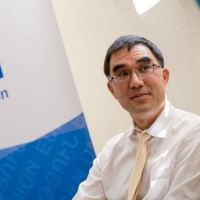
Hoa-Binh Adjemian is the Deputy Head of the thematic Unit “An economy that works for people, green, digital and connected” of the Directorate-General for Neighbourhood and Enlargement Negotiations at the European Commission. He was previously the Head of Cooperation for the EU Delegation to Armenia, and Head of Infrastructure in Benin. Binh also has an extensive experience in Public Private Partnerships in Asia. He has graduated from Harvard Kennedy School of Govern ment, l’Ecole Polythechnique and l’Ecole des Ponts et Chaussées in Paris with a MPP, M.Sc and M.Eng. He is married with three kids

Pauline Laufer, 25, Germany, Youth Envoy, ITU Generation Connect Europe Youth Group. She grew up in a rural town in North-Rhine-Westphalia, Germany. Since a young age, her mother supported her and her two sisters to do sports and engage in volunteer work. This shaped her view on the world and naturally drive her to dedicate her free time to projects for the community. She learned a lot while volunteering, especially that if you raise your voice, you can really make a change. Because she felt so much support in her young years, she is eager to give this back and make an effort for other young people. She was really honoured of being elected as delegate to the Y20 in 2021 to represent the German youth. After finishing school with the Abitur, she studied Medical Engineering. After graduating, she moved to Münster to study for a master’s in biomedical technologies. Aside from her engagement, she worked as a working student in quality management and currently in machine learning in healthcare.

Maksim Burianov is a lawyer, researcher, supporter of global digital cooperation, was the ambassador of the SDG UN in the framework of the promotion of the 2030 Agenda for Sustainable Development. He is currently studying for a master's degree at the Department of International Law and Human Rights. Maksim is a member of the International Telecommunication Union of the United Nations (ITU UN) Youth Council in the CIS and participant of the Generation Connection project. The lead of the "Global Digital Human Rights for the 4IR" and director of the Global Law Forum. Researcher of global processes and risks. He is the winner of international scientific competitions in the field of jurisprudence, integration processes (Eurasia, CIS), and digital technologies (GovTech, industry 4.0). Author of two scientific monographs. Member of the Global Shapers Community of the World Economic Forum. He is an active participant in the Davos Lab project from Global Shapers. Maksim is an active fighter for human rights, and the author of the concept of global digital human rights. Expert in the field of digitalization of law, global education, and global law. He is a supporter of fair global governance for the transition to the sustainable development of civilization.

Maksim Burianov is a lawyer, researcher, supporter of global digital cooperation, was the ambassador of the SDG UN in the framework of the promotion of the 2030 Agenda for Sustainable Development. He is currently studying for a master's degree at the Department of International Law and Human Rights. Maksim is a member of the International Telecommunication Union of the United Nations (ITU UN) Youth Council in the CIS and participant of the Generation Connection project. The lead of the "Global Digital Human Rights for the 4IR" and director of the Global Law Forum. Researcher of global processes and risks. He is the winner of international scientific competitions in the field of jurisprudence, integration processes (Eurasia, CIS), and digital technologies (GovTech, industry 4.0). Author of two scientific monographs. Member of the Global Shapers Community of the World Economic Forum. He is an active participant in the Davos Lab project from Global Shapers. Maksim is an active fighter for human rights, and the author of the concept of global digital human rights. Expert in the field of digitalization of law, global education, and global law. He is a supporter of fair global governance for the transition to the sustainable development of civilization.

Jaroslaw K. Ponder, Head of the Office for Europe at the International Telecommunication Union (ITU) (Geneva, Switzerland), representing ITU in Europe and directing actions, projects, initiatives and experts groups targeting 46 countries of the Europe Region. His portfolio includes set of Regional Initiatives for Europe, designed by the European Member States and focusing on the ICT Infrastructure, Digitization, Digital Inclusion, Accessibility, Innovation and Cybersecurity. Along the professional career, Mr. Ponder held official positions in the public sector and was a contributor to the legislative projects having the impact on the public policy. Since 2014, Mr. Ponder has been working for ITU holding diverse positions in the General Secretariat, Telecommunication Development Bureau, and Regional Presence, addressing complexity of information society development and digital transformation at national, regional and international levels, including the United Nations level. For several years he has managed ITU's work on the United Nations World Summit on the Information Society (WSIS) process, leading towards the establishment of the annual WSIS Forum, WSIS Prizes, WSIS Stocktaking, others.
-
 C1. The role of governments and all stakeholders in the promotion of ICTs for development
C1. The role of governments and all stakeholders in the promotion of ICTs for development
-
 C2. Information and communication infrastructure
C2. Information and communication infrastructure
-
 C3. Access to information and knowledge
C3. Access to information and knowledge
-
 C4. Capacity building
C4. Capacity building
-
 C5. Building confidence and security in use of ICTs
C5. Building confidence and security in use of ICTs
-
 C6. Enabling environment
C6. Enabling environment
-
 C7. ICT applications: benefits in all aspects of life — E-government
C7. ICT applications: benefits in all aspects of life — E-government
-
 C7. ICT applications: benefits in all aspects of life — E-business
C7. ICT applications: benefits in all aspects of life — E-business
-
 C7. ICT applications: benefits in all aspects of life — E-employment
C7. ICT applications: benefits in all aspects of life — E-employment
-
 C7. ICT applications: benefits in all aspects of life — E-science
C7. ICT applications: benefits in all aspects of life — E-science
-
 C11. International and regional cooperation
C11. International and regional cooperation
-
 Goal 4: Ensure inclusive and equitable quality education and promote lifelong learning opportunities for all
Goal 4: Ensure inclusive and equitable quality education and promote lifelong learning opportunities for all
-
 Goal 5: Achieve gender equality and empower all women and girls
Goal 5: Achieve gender equality and empower all women and girls
-
 Goal 8: Promote inclusive and sustainable economic growth, employment and decent work for all
Goal 8: Promote inclusive and sustainable economic growth, employment and decent work for all
-
 Goal 9: Build resilient infrastructure, promote sustainable industrialization and foster innovation
Goal 9: Build resilient infrastructure, promote sustainable industrialization and foster innovation
-
 Goal 10: Reduce inequality within and among countries
Goal 10: Reduce inequality within and among countries
-
 Goal 17: Revitalize the global partnership for sustainable development
Goal 17: Revitalize the global partnership for sustainable development